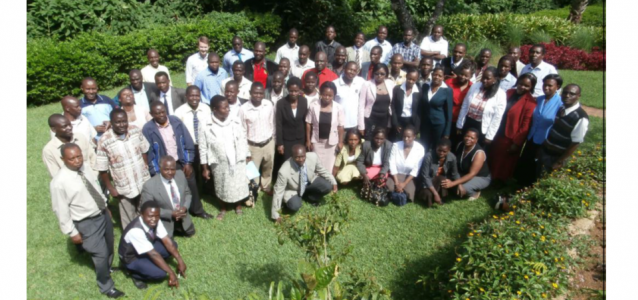The Climate System Analysis Group (CSAG) engaged in a year-long project with the Malawi Department for Climate Change and Meteorological Services (DCCMS), funded by the World Bank. The primary objective of CSAG’s involvement in this project was to develop and support training and capacity development within DCCMS with the goal of enhancing DCCMS’s production and delivery of climate information to end users. To meet this objective, CSAG worked with key personnel in DCCMS to address key issues related to existing infrastructure, skills, methods and tools.
The first engagement in the project involved a number of DCCMS staff attending a two week Winter School hosted by CSAG in Cape Town. The course covered the major topics of climate science, the impacts of climate change and methods to understand vulnerability and implement adaptation strategies. Based on this experience, a meeting was held with those DCCMS staff that attended to begin articulating the key topics that would be relevant to building the skills of other DCCMS staff in the context of the project scope.
In September 2012, two members of CSAG travelled to Blantyre in Malawi to speak to the Director of DCCMS and other individuals working on issues related to climate change. A two day inception meeting brought together DCCMS staff with stakeholders to discuss the needs and desires of DCCMS and the user community in Malawi regarding the provision of climate services. Priority areas were identified to inform the focus of the training; namely historical climate analysis, seasonal forecasting and its applications, and climate change.
A vital part of the project was the “training of trainers” workshop that took place in Blantyre in November 2012. DCCMS nominated ten members of staff to attend the week-long workshop; these people were then responsible for facilitating subsequent training throughout the rest of the organization. Two members of CSAG developed training materials which included presentations on the priority topics, group exercises, focused discussion questions and a document to capture participant feedback. The training challenged the DCCMS staff and given the different levels of skill and expertise it was clear that further support would be necessary to successfully meet the objectives of the project.

The final phase of the existing project was the roll-out of training to the rest of the organization. One member of CSAG travelled to Zomba in April 2013 to help facilitators prepare before the first internal training commenced and to observe the first day of the training. Participant feedback suggests that the internal training was a success. Clearly further capacity support will benefit DCCMS but through this project the organization is in a stronger position to support Malawians respond to the changing risks associated with climate variability and climate change.
